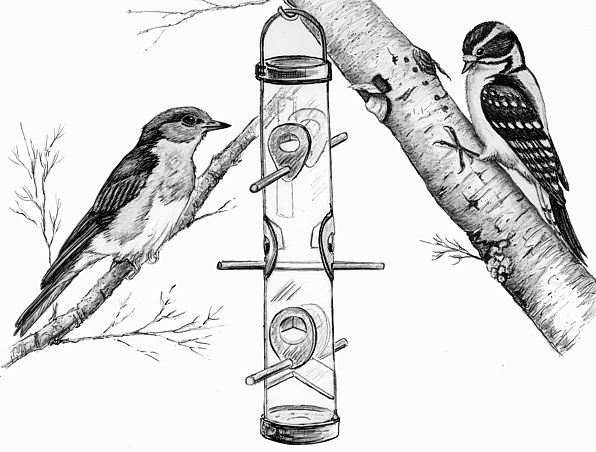
Annual clean-up,
It’s the beginning of a new year and this is when I like to briefly touch on some topics that I have written about in the past. I don’t know if anyone else notices but I try not to answer the same questions too often. If I didn’t filter out questions, then the only inquiries I’d ever answer would be: “How do I keep squirrels off my feeder?” and “What is the correct formula for hummingbird food?” However, once in a while it doesn’t hurt to briefly repeat a few of them. I know we all forget things from time to time. Heck, I can’t seem to remember that it’s a new year already. Here we are two weeks into 2010 and I’m still writing “1997” on my checks.
The first item on this year’s repeat list is about wintering bluebirds. In many locations bluebirds are considered to be a bird of summer, but this is not the case on old Cape Cod. Judging by the number of calls I receive from excited customers, we have more bluebirds when the snow flies than we do when the flies fly. If you happen to be one of the few folks who don’t have bluebirds coming to your yard this winter, you must be wondering what you have to do to get them. My answer is: Don’t do anything special. Getting bluebirds is pretty much a crapshoot. They’re like varicose veins; you’re either going to get them or you’re not. People who get wintering bluebirds typically say they come to three things. The first item is water. I get more reports of bluebirds being attracted to heated birdbaths than anything else. The second and third things are sunflower hearts (sunflower seeds without the shells) and suet. While these two items might not be the bluebirds’ ultimate favorite food, they do eat them and so do all of the other birds. I wouldn’t go crazy with specialty foods (meal worms, etc.) until you actually have bluebirds coming to your yard. After that, if you want to go crazy, be my guest.
Here’s another oldie but goodie. It has to do with feeding birds and then leaving for the winter. If you are one of those cowards who exit this area in order to avoid our fabulous New England winters you will be happy to know that you can leave and your birds will be okay. The idea that “your birds” are dependent upon you might give you a sense of importance, but the truth is that they will be fine with or without you. However, here is something you can’t do: You should never, ever leave a feeder outside when you are not going to be around to maintain it. This applies all you weekenders, too. (Do you hear me?) I just got off the phone with a woman who returned to her home in Truro after being in Boston all week, only to find a dead chickadee in her unattended feeder. I would like to say that this is the first time I have heard a story like that but unfortunately, it isn’t. I get these calls all too often. Remember, we feed birds for our own entertainment. It’s pointless and possibly harmful to have feeders out when we aren’t there to keep an eye on them. Don’t worry, the birds will be there to welcome you back when you put your feeders out again. And then you can feel self-important once again.
Next we have a bird that has been rocketing its way up the hate list so fast that it has moved past such perennial favorites as crows, gulls and Blue Jays. I’m talking about woodpeckers. As storms and chainsaws continue to mow down one of our most valuable resources, dead trees, woodpeckers have turned to our wooden homes as a handy alternative. Customers complain about this problem so often that we now keep the woodpecker deterrent products right at the front cash register, instead of in the back. I’d like to say we moved them up front so we can assist our customers more quickly but we really do it because we are too lazy to walk all the way to the back of the store.
Woodpeckers hammer on buildings for several reasons; the most common reason is to announce their territories. While this banging can be annoying to the homeowner, and funny to the rest of us, it typically does not result in any damage. However, some times the birds find insects, or think they have found insects, and that’s when things get ugly. There are dozens of remedies for this problem but the item we have found that works the best is Mylar reflective tape. Strips of this shiny ribbon, strung over the problem area, more often than not does the trick. Of course your house will end up looking like a bad float in the Mardi Gras parade, but what’s wrong with that?
There, that’s it for this year’s batch of repeat quickie questions. When I first started this column, I imagined that I’d be writing about twenty different subjects, but somehow I only managed to get to three. I promise to do another set of repeat questions next year. That won’t be too long a wait. There’s only about 340 days to go until 1998.